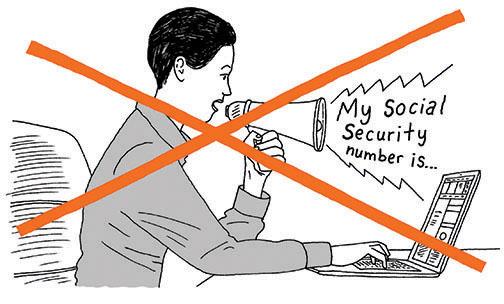It is impossible to be completely safe in a public sphere such as the Internet, but there are steps people can take to increase their security. Many require little more than the exercise of common sense: Keep your computer in a secure place and don’t allow strangers to use it; don’t input sensitive information on any computer but your own; install antivirus software and keep all your software up-to-date; never open attachments from people you don’t know. More sophisticated techniques also may be useful, but they can be cumbersome to use and can slow your browsing experience.
It is impossible to be completely safe in a public sphere such as the Internet, but there are steps people can take to increase their security. Many require little more than the exercise of common sense: Keep your computer in a secure place and don’t allow strangers to use it; don’t input sensitive information on any computer but your own; install antivirus software and keep all your software up-to-date; never open attachments from people you don’t know. More sophisticated techniques also may be useful, but they can be cumbersome to use and can slow your browsing experience.

Don’t allow your browser to accept cookies, the text files downloaded onto your computer when you visit a site for the first time, which allow sites to track your browsing.

Choose your passwords carefully: They should be at least 10 characters, including letters, numbers, and symbols. Do not use: a word in the dictionary of any language, a simple sequence such as “abc123,” or a piece of public information about you (including your alma mater and class year). Change your passwords frequently, and do not store them in the computer in a file called “Passwords.”
Encrypt your email and files you store on the cloud (that’s a network of servers). Encryption tools are available online. Secure the key — which you will need to unscramble the files — on another computer, or on paper.
Use a browsing encryptor such as HTTPS Everywhere (https://www.eff.org/https-everywhere) or Tor (www.torproject.org), which help send data securely.
Turn off applications you are not using, particularly those that track your location.
Some search engines, such as Startpage or DuckDuckGo, do not log personally identifiable information, helping you browse without being tracked.

Avoid sending sensitive information such as your PIN, password, Social Security number, or credit-card number by email or text. Enable your browser’s “Do not track” function.
Foil computer spies by blocking spyware (some experts suggest using the program PeerBlock) and covering your computer’s webcam with masking tape when you are not using it.
For more information on digital privacy and security, visit sites such as the Electronic Frontier Foundation (www.eff.org) and www.consumer.ftc.gov/articles/0009-computer-security.

